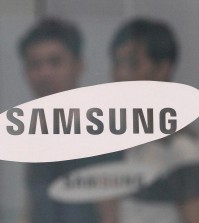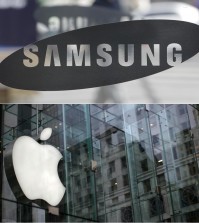- California Assembly OKs highest minimum wage in nation
- S. Korea unveils first graphic cigarette warnings
- US joins with South Korea, Japan in bid to deter North Korea
- LPGA golfer Chun In-gee finally back in action
- S. Korea won’t be top seed in final World Cup qualification round
- US men’s soccer misses 2nd straight Olympics
- US back on track in qualifying with 4-0 win over Guatemala
- High-intensity workout injuries spawn cottage industry
- CDC expands range of Zika mosquitoes into parts of Northeast
- Who knew? ‘The Walking Dead’ is helping families connect
S. Korea’s Telecom Act stifling sales of Galaxy S6, G4
Dealerships urge gov’t to allow them to engage in promotional events

Posters promoting raised subsidies for those who buy Samsung Electronics’ Galaxy S6 and S6 Edge are attached to a handset outlet in central Seoul, Monday. Local telecom companies increased the subsidies to attract more subscribers to the new Samsung smartphones a week after their release on April 10. (Yonhap)
By Bahk Eun-ji
LG Electronics will release its latest smartphone, the G4, on Wednesday and seek to steal customers from its bigger rivals Samsung Electronics and Apple.
LG is betting big on the new smartphone to gain fresh momentum in its earnings.
However, it faces a bigger obstacle than Samsung and Apple in the domestic market ― the Telecom Act, which caps handset subsidies.
Two weeks ago, the KCC raised the maximum amount of subsidy that customers can receive when buying a new handset to 330,000 won (about $308), from 300,000 won ($280).
However, the maximum subsidy is possible only for those who choose the highest monthly phone bill rate. For most consumers, the actual subsidies available for them are insignificant. That’s why they are not buying new handsets.
The government has drawn criticism for the enforcement of the Telecom Act from all interested parties, including consumers, telecom companies and retail shop operators.
In particular, retail handset dealerships have condemned the act as their handset sales plunged after the Mobile Distribution Act took effect in October.
Under the current law, when consumers buy Samsung’s Galaxy S6 and select a highest phone bill rate, they can receive up to 330,000 won in subsidies.
Normally, retail shop owners get rebates from telecom companies when they sell new handsets, but if customers do not buy the devices at the shop, the owners will not get the rebate.
Besides, if customers cancel their contracts before six months, the shop owners have to pay a 200,000 won (about $187) penalty to the telecom companies.
The retail shop owners also said that only customers who select the highest rate system benefit from the biggest subsidies while the majority of customers who select the cheaper ones do not.
“Most consumers are not entitled to sufficient subsidies as they can’t afford the highest phone bill rate. So they cannot change phones to new ones due to the small subsidies, especially if the handset price tag is about 1 million won (about $935),” said Lee Ju-hong, a policy director of Green Consumer Network in Korea.
Lee said that most consumers do not realize they actually benefit from the new mobile act.
Handset retail shop owners say they should be allowed to launch various sales promotion events and be given more leeway in giving handset subsidies.
“I can’t even give a 20,000 won (about $18) mobile phone cover as a gift for a regular customer who has come to my store for more than 10 years, just because of the policy,” said a retail shop owner at Techno Mart, the nation’s largest electronics shopping center in Seoul.
The owner, surnamed Kim, said the policy only hinders building trust between mobile operators and consumers.
Mindful of the growing grievances from dealerships and consumers, Korea Communications Commission (KCC) Chairman Choi Seung-joon recently visited a cluster of handset retail shops to check whether the new mobile act has been working well, as it’s been more than six months since the law took effect.
There, he pledged to reflect the shop owners’ complaints on its policy.
“The problems have surfaced in the process of the settlement of the new act. The watchdog body will soon make all efforts to find the solution together with mobile carriers and retail operators,” he said.
Only a week after the decision, three mobile carriers ― SK Telecom, KT and LG Uplus ― announced they will offer bigger subsidies to promote sales of Samsung Electronics’ Galaxy S6 and S6 Edge.
However, the belated increase angered customers who have already bought the devices at higher prices.
Retail shop owners also said customers cannot find any reason to visit the shopping center or other shops after the mobile act, because the price or benefits have become similar in every shop.
They said the act has frozen all possible promotional campaigns among dealerships.
















